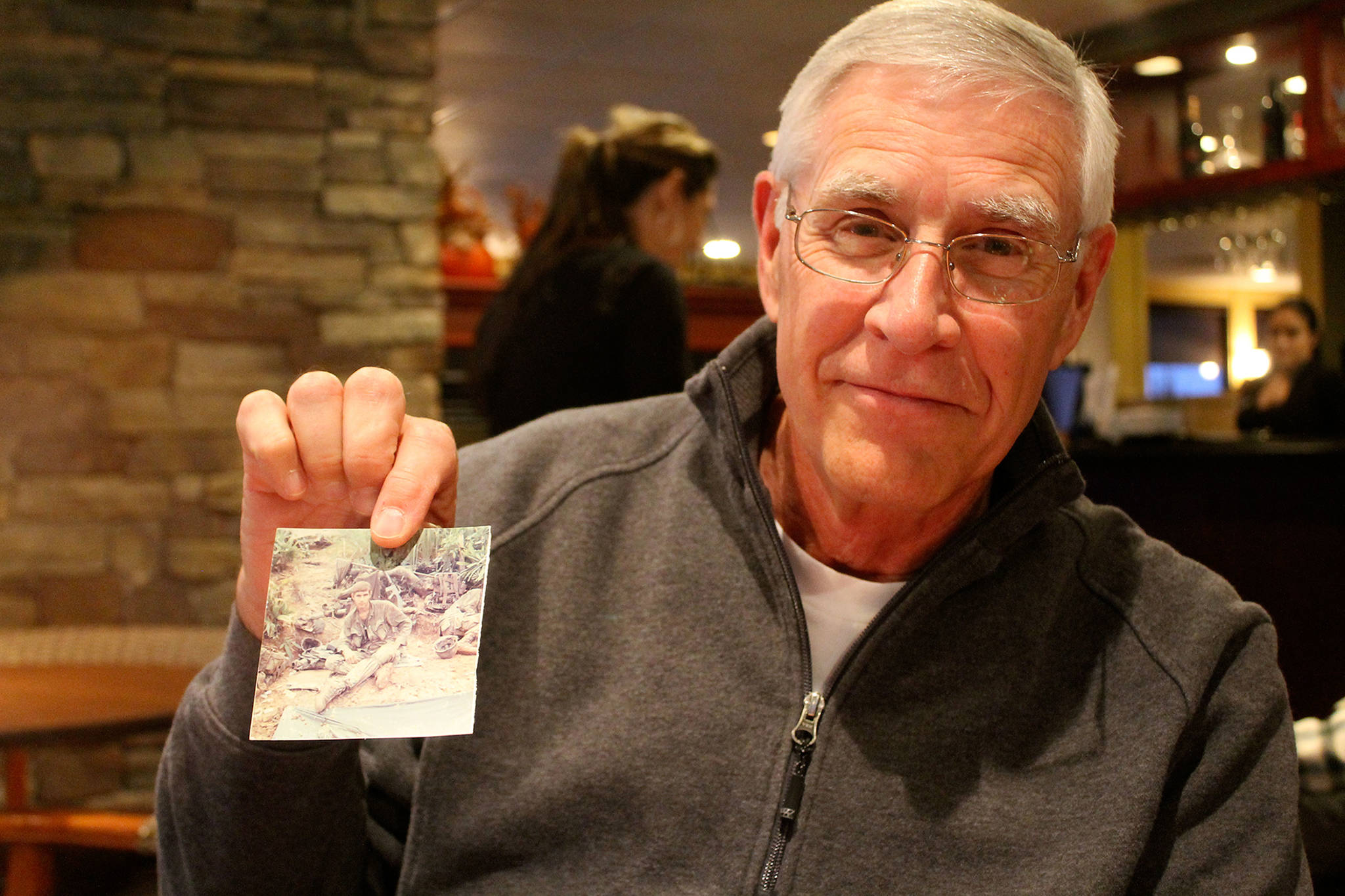When Marine Joe Simon came home after seeing nearly a year of combat in Vietnam, he bottled up his experiences and hid them away.
It was both a coping mechanism and a way of processing what happened to him between January 1969 to December 1969. He’d survived close calls with death, seen friends wounded or killed, suffered through dysentery, hunger, thirst and sleep deprivation, all while serving a cause he did not fully understand or wholeheartedly support.
But, he fought for his buddies and they fought for him.
“It’s hard to put into words,” Simon said. “It becomes kind of an ethic that you live with. You’re always there for whoever.”
Simon, a 68-year-old Useless Bay resident, remembers them fondly every year on Veteran’s Day, and on many other days too. It’s not often he shares his experiences, but when he does, the memories pour out.
The calling
Simon enlisted in the Marines with a friend in 1968. He joined despite knowing with almost certainty that he’d be sent to Vietnam.
“If you enlisted in the Marine Corps at that time, odds are you’re going to Vietnam,” Simon said.
He considered himself a patriotic American, though he had questions about the war that still linger to this day.
“Today, I think we should have never been there in the first place,” Simon said. “We were totally lied to.”
The reality of his choice set in for the heavy weapons specialist when he arrived in Vietnam in January 1969. As his plane was setting down at a combat base, green and red tracers from both American and North Vietnamese forces skirted across the early morning sky. His heart sank when he saw dead Americans being carried into a medical station, an ominous sign of things to come.
“I thought, ‘What did I get myself into?’” Simon said.
Simon often spent over a month at a time “out in the bush” with Foxtrot Company of the 2nd Battalion, 3rd Marines conducting patrols and searching for the enemy near the Demilitarized Zone, also known as the “Dead Marine Zone.” They went weeks without showers, slept in the mud and were often short on food and water. When they received brief respites from the front lines, they stuck out like sore thumbs compared to rear-echelon units.
“You don’t realize how dirty you are,” Simon said.
Close calls
Simon was almost killed by a sniper near Cam Lo in the Quang Tri Province. He heard a “ping” of a bullet striking a rock he was sitting next to and quickly found cover.
On his 20th birthday, July 12, Simon choppered into a hot landing zone as mortars fell from the sky. He made it through the day unscathed.
Simon was never wounded during his tour.
“I was just one of those big dumb lucky guys,” Simon said.
As Simon adjusted to life in combat, he became more and more disillusioned about the way the war was being fought. It seemed they were always fighting over the same territory without a sense of purpose or indication that the war was coming to an end. Decision makers believed that if more North Vietnamese Army (NVA) soldiers were killed than Americans were lost, they were winning. To men like Simon on the front lines, it was a disconcerting strategy.
“I grew more and more frustrated because you’d go to the same area, then they’d pull you back, and then they’d send you back to the same area,” Simon said. “You’re always crisscrossing the same ground.”
“It just never seemed to end,” he added.
Coming home
Simon left Vietnam in December 1969. He returned to a country in the midst of protest. Veterans often returned to their normal lives without receiving the same level of recognition as those who returned from previous wars. Whether they were blamed, shunned or ignored, Simon felt it was undeserved.
“Quite frankly, in 1970 there wasn’t a lot of understanding of people,” Simon said.
He found it difficult to explain to those who asked about his experiences. Most times, he didn’t feel like he needed to, unless it was with a fellow combat veteran.
“I’ll never really be able to describe it,” Simon said. “I really don’t talk about it.”
He credited other veterans and his wife, Laine, for keeping him grounded despite the residual effects of the war. Simon for many years did not have any conscious dreams, yet his wife would tell him that he talked about the war in his sleep. It was how his brain processed his experiences.
“You came home and you put it in a box,” Simon said. “I put it in a box in my brain and I didn’t open the box.”
Simon later graduated from the University of Washington with a degree in economics. He spent the next 30 years in law enforcement, retiring as a police chief in Albany, Ore.
Recognition
A proud moment for Simon came when his two granddaughters invited him to their school for a Veteran’s Day assembly. It was the first time he was formally recognized for his service; Simon now returns every year for the annual assembly.
“It brings you to tears,” Simon said.
“…I always stand tall on Veteran’s Day. Once a Marine, always a Marine. The thing is, you never lose it.”



